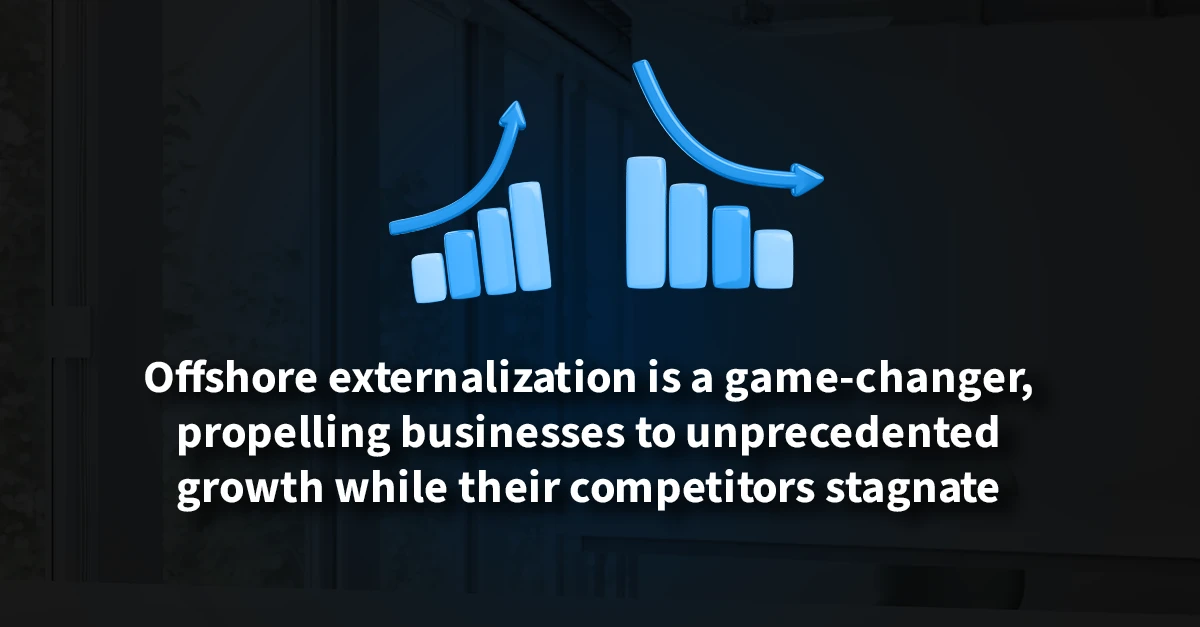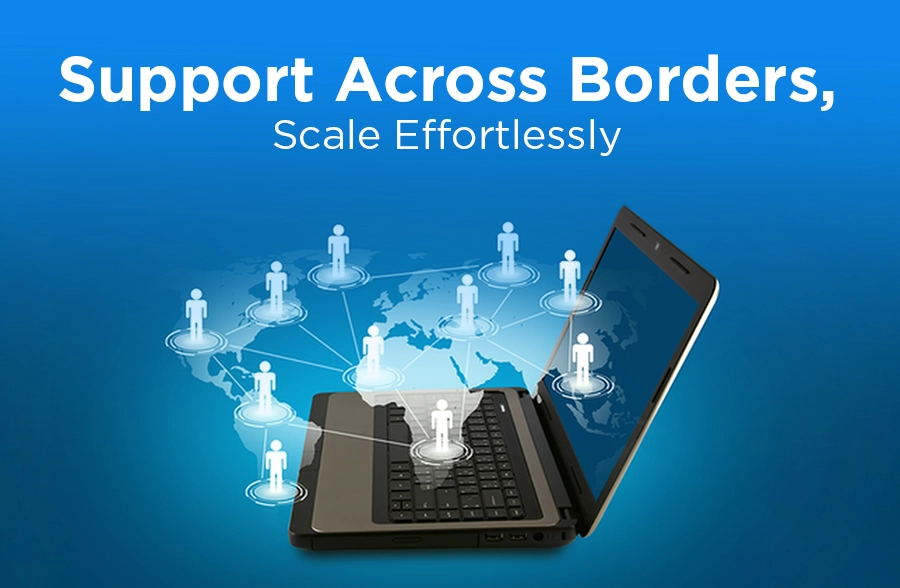Schedule a FREE call with our outsourcing expert now and get a precise quotation that meets your requirements. Don't wait - get started today!
In today’s interconnected world, businesses constantly look for ways to enhance operations, reduce costs, and expand their global reach. One strategy that has gained significant traction is externalization offshore. This approach allows companies to delegate specific business functions to external service providers in different countries, offering numerous benefits.
In this article, we will explore how externalization offshore can drive global business growth, improve efficiency, and ultimately lead to increased customer satisfaction.
The Basics of Externalization Offshore
Externalization offshore involves delegating tasks to external providers located outside a company’s home country. This practice is often confused with offshore outsourcing services, which specifically refers to contracting business functions to foreign companies.
The types of offshore outsourcing can range from customer service and technical support to IT management and human resources.
By adopting this strategy, businesses can focus on their core operations while outsourcing non-core tasks. This not only streamlines processes but also allows for better allocation of resources.
Two years ago, 70% of surveyed executives indicated cost was a primary reason for outsourcing. (Deloitte)
The Economic Landscape of Externalisation Offshore
To fully understand the impact of externalization offshore, it is essential to consider the broader economic landscape. With a predicted value of USD 280.64 billion in 2023, the worldwide business process outsourcing market is expected to increase at a compound annual growth rate (CAGR) of 9.6% between 2024 and 2030. (Grand View Research)
This growth highlights the increasing reliance on outsourcing as a strategic tool for business expansion.
Externalization offshore not only offers cost savings but also allows businesses to remain competitive in an ever-changing market. By outsourcing, companies can quickly adapt to market demands without the need for significant capital investment.
For instance, businesses can scale their operations up or down based on seasonal fluctuations or changing customer needs. This agility is crucial for maintaining a competitive edge.
Key Benefits of Externalisation Offshore
Cost Reduction
One of the primary reasons businesses opt for externalization offshore is the potential for significant cost savings. Companies can reduce their operational costs by outsourcing services to countries with lower labor expenses.
For instance, according to research by Unity Communications, You can save up to 50% and 60% on operating and labor expenditures, respectively, by hiring a BPO provider in the nation.
Additionally, outsourcing allows companies to avoid the high costs associated with hiring, training, and maintaining in-house staff. This cost-effectiveness makes externalization offshore an attractive option for businesses of all sizes.
Enhanced Efficiency
Outsourcing allows companies to streamline their processes and improve operational efficiency. By handing over specific business functions to external providers, companies can benefit from the expertise and specialization of these providers. This specialization often leads to faster turnaround times and higher-quality outcomes.
According to 65% of businesses surveyed by Psicomart, outsourcing has improved overall productivity and helped them optimize processes.
For example, a company that outsources its IT services can benefit from a dedicated team of experts who are up-to-date on the latest technologies and best practices.
This specialized knowledge can result in faster issue resolution and a more reliable IT infrastructure.
Access to Global Talent
Externalization offshore opens up a vast pool of talent from around the world. Businesses can tap into skilled professionals who possess the expertise needed for various functions, such as technical support or customer service.
According to a report by Orience, companies will also need to adjust their travel, short-term assignment, and global workforce structure policies in light of this development.
This access to global talent can lead to innovative solutions and diverse perspectives, ultimately enhancing a company’s competitive position. Companies that embrace this diversity often find that it leads to more creative problem-solving and better decision-making.
Increased Focus on Core Business
By outsourcing non-core functions, companies can concentrate their efforts on what they do best. This focus on core business can lead to innovation and growth. as demonstrated by a case study of a top technology business whose outsourced teams’ productivity increased by 20% as a result of the use of cloud-based communication tools. Businesses may take advantage of outsourcing’s advantages in the new remote work environment and promote long-term growth by combining these tactics. (Psico)
For example, a manufacturing company might choose to outsource its logistics and customer service functions to focus on production and product development. By doing so, they can allocate more resources toward improving their products and expanding their market reach.
Improved Customer Satisfaction
Customer satisfaction is essential for long-term success. When companies choose to externalize offshore, they often do so to enhance their customer service. By outsourcing customer support functions, businesses can provide 24/7 assistance, reduce wait times, and ensure that customer inquiries are handled by experts.
In addition, outsourcing enables companies to tailor their customer service offerings to meet the needs of different markets.
For instance, a company operating in multiple countries can outsource its customer support to local providers who understand the cultural nuances and preferences of each market.
Nearshore Outsourcing: A Strategic Alternative
While offshore outsourcing offers many benefits, some businesses prefer nearshore outsourcing as a strategic alternative.
Nearshore outsourcing involves contracting services from nearby countries, allowing for similar cost savings while reducing cultural and time zone differences. This approach can improve collaboration and communication, leading to better results.
For example, a company based in the United States might choose to outsource to Mexico or Canada instead of Asia. This geographical proximity can facilitate smoother interactions, faster response times, and a more seamless integration of services.
Common Business Functions for Externalization Offshore
Several business functions are commonly outsourced to external providers, including:
- Customer Service: As mentioned earlier, outsourcing customer service can significantly enhance customer satisfaction. Many companies turn to BPO (Business Process Outsourcing) providers to handle their customer support, ensuring they can offer round-the-clock service.
- Technical Support: Companies often outsource technical support to ensure customers receive expert assistance. This not only improves service quality but also allows internal teams to focus on higher-level tasks.
- IT Services: Outsourcing IT functions, such as software development and infrastructure management, enables businesses to access specialized expertise while reducing operational costs.
- Human Resources: Many organizations choose to outsource HR functions, such as payroll processing and recruitment, to streamline their operations and focus on strategic HR initiatives.
- Accounting and Finance: Outsourcing accounting functions allows companies to access experienced professionals who can handle complex financial tasks, ensuring compliance and accuracy while freeing internal resources for core activities.
- Marketing and Advertising: Businesses can also choose to outsource their marketing and advertising efforts to specialized firms that can provide targeted campaigns and analytics to drive growth.
Challenges of Externalization Offshore
While the benefits of externalization offshore are significant, there are also challenges to consider. Some of these include:
- Communication Barriers: Working with external providers in different countries can lead to misunderstandings and communication challenges. It’s essential to establish clear communication channels and protocols to mitigate these issues.
- Quality Control: Ensuring that the outsourced services meet quality standards can be challenging. Businesses must carefully select providers and establish performance metrics to maintain service quality. According to studies, businesses that outsource performance management might experience up to 30% gains in productivity.
- Cultural Differences: Different cultural norms and practices can impact how business is conducted. Companies should take the time to understand the cultural context of their outsourcing partners. This understanding can foster better relationships and enhance collaboration.
Despite these challenges, many businesses find that the benefits of externalization offshore far outweigh the drawbacks. By carefully selecting outsourcing partners and establishing clear communication and performance metrics, companies can effectively manage these challenges.
Best Practices for Successful Externalization Offshore
To maximize the benefits of externalization offshore, companies should follow these best practices:
- Conduct Thorough Research: Before choosing an outsourcing partner, businesses should conduct comprehensive research to understand the provider’s capabilities, reputation, and experience in the industry.
- Establish Clear Goals: Clearly defining the goals and expectations for the outsourcing arrangement will help ensure alignment between the business and the provider.
- Communicate Regularly: Maintaining open lines of communication is essential for success. Regular check-ins and updates can help address any issues before they escalate.
- Monitor Performance: Establishing key performance indicators (KPIs) will allow businesses to measure the success of the outsourcing arrangement and make necessary adjustments.
- Focus on Building Relationships: Building a strong relationship with the outsourcing partner can lead to better collaboration and improved results. Companies should invest time in understanding their partners’ strengths and capabilities.
- Train Internal Staff: Providing training for internal staff on how to work effectively with outsourced teams can bridge communication gaps and foster collaboration. This training can include cultural awareness and technology use to improve interactions.
- Be Flexible and Adaptable: The business environment is constantly changing. Companies should remain flexible and adapt their outsourcing strategies to meet evolving market demands and customer expectations.
Case Studies: Success Stories of Externalization Offshore
Numerous companies have successfully leveraged externalization offshore to drive growth and enhance efficiency. Here are a couple of examples:
- Company A: A retail company in the United States outsourced its customer service operations to a provider in the Philippines. By doing so, they were able to offer 24/7 support, reduce operational costs by 40%, and improve customer satisfaction ratings by 25% within six months.
- Company B: A tech startup based in Canada outsourced its technical support to a nearshore provider in Mexico. This decision allowed them to reduce response times significantly and enhance the quality of their support, leading to a 30% increase in customer retention.
- Company C: A financial services firm in the UK outsourced its accounting functions to an offshore provider in India. This move not only saved the company 50% in operational costs but also improved accuracy and compliance in financial reporting, allowing internal staff to focus on strategic initiatives.
These case studies illustrate how externalization offshore can lead to tangible benefits, including cost savings, improved efficiency, and enhanced customer satisfaction.
The Role of Technology in Externalization Offshore
Technology plays a crucial role in the success of externalization offshore. The rise of cloud computing, communication tools, and project management software has made it easier for businesses to collaborate with external partners.
Companies can now share information, track progress, and communicate in real time, regardless of geographical location.
For example, tools like Slack, Zoom, and Asana enable seamless communication and collaboration between in-house teams and outsourced providers. These technologies facilitate quick updates and feedback, reducing the likelihood of misunderstandings.
Additionally, automation technologies can enhance the efficiency of outsourced operations. By automating repetitive tasks, businesses can free up resources and improve accuracy.
For instance, robotic process automation (RPA) can streamline data entry and processing in accounting functions, allowing outsourced teams to focus on higher-value tasks.
Conclusion: The Future of Externalization Offshore
Externalization offshore is a powerful strategy that drives global business growth. By outsourcing specific business functions, companies can reduce costs, enhance efficiency, and focus on their core operations. This approach not only improves operational performance but also leads to higher customer satisfaction.
For businesses looking to explore the benefits of externalization offshore, partnering with a trusted provider like Magellan Solutions can make a significant difference. With expertise in offshore outsourcing services, Magellan Solutions can help your business enhance efficiency, reduce operational costs, and expand its global reach.
Unlock your business potential with us! Book your FREE 60-minute business consultation today, and let’s strategize how to elevate your operations—NO COMMITMENTS, just results-driven insights!















